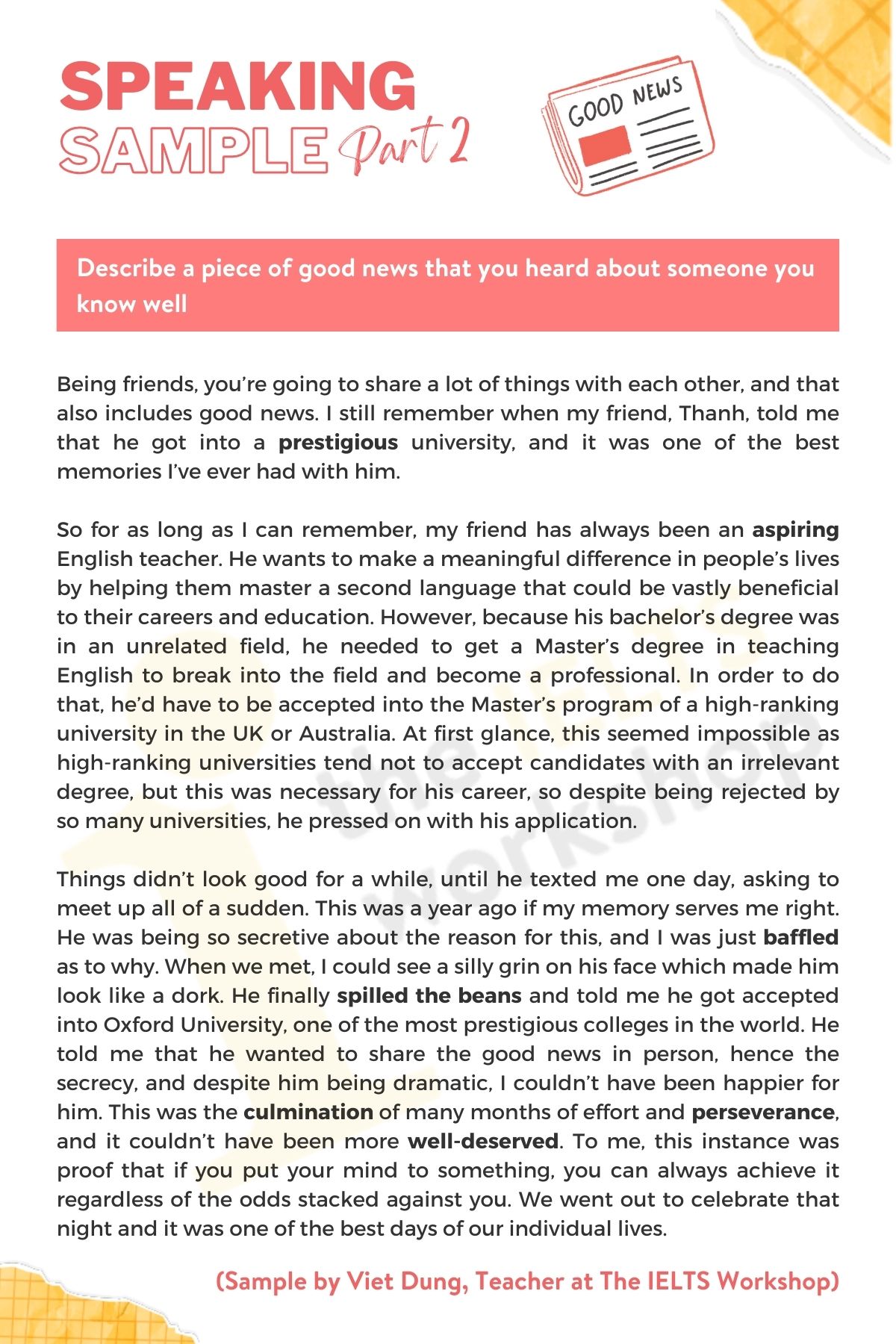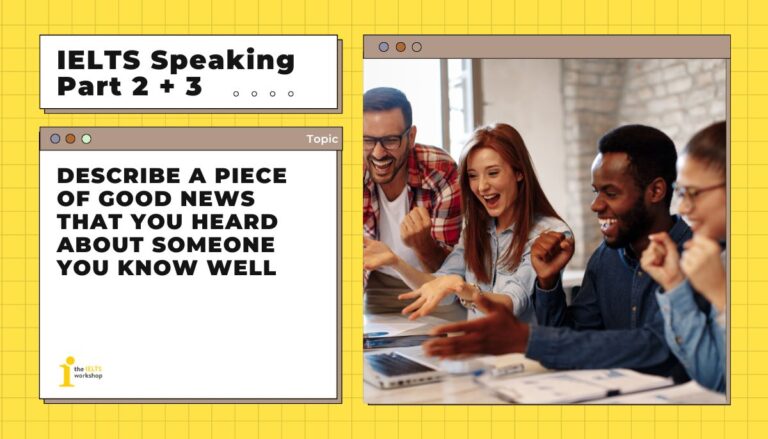Trong bài giải mẫu lần này, thầy Viết Dũng của The IELTS Workshop HN sẽ hướng dẫn bạn trả lời topic “Describe a piece of good news that you heard about someone you know well“ trong IELTS Speaking Part 2. Cùng tham khảo sample, từ vựng và một vài cách diễn đạt ghi điểm trong phần thi IELTS Speaking nhé.
Part 2: Describe a piece of good news that you heard about someone you know well
Describe a piece of good news that you heard about someone you know well
You should say:
What it was
When you heard it
How you knew it
And explain how you felt about it
Dưới đây là bài mẫu cho topic “Describe a piece of good news that you heard about someone you know well“.
1. Bài mẫu (Sample)

2. Từ vựng (Vocabuary)
- prestigious (adj): danh giá
- aspiring (adj): khao khát, đầy tham vọng
- baffled (adj): bối rối, khó hiểu
- spill the beans: nói ra, kể ra 1 bí mật
- culmination (n): kết quả
- perseverance (n): sự kiên trì
- well-deserved: xứng đáng
Part 3:
Bên cạnh Part 2, bạn hãy tham khảo thêm Part 3 cho chủ đề này nhé
1. Is it good to share something on social media?
2. Should the media only publish good news?
3. How does social media help people access information?
4. What kind of good news do people often share in the community?
5. Do most people like to share good news with others?
6. Do people like to hear good news from their friends?
Depends on the message you’re sharing.
If you’re sharing some good news about your personal life with your family and friends or some uplifting content like dog pictures or motivational quotes, then I don’t see why it’s a bad thing. These kinds of positive content need to be spread more on social media, unlike negative news, polarizing topics, or whiny posts that are predominantly circulating online and contribute to people’s doomscrolling.
However, if a person shares something too intimate on Facebook to complete strangers, such as a private family matter, then it would be kinda inappropriate.
- uplifting (adj): tích cực
- motivational (adj): tạo động lực, tạo cảm hứng
- polarizing (adj): gây tranh cãi
- doomscrolling (n): việc đọc rất nhiều tin tức tiêu cực trên mạng xã hội
2. Should the media only publish good news?
Definitely not.
On the one hand, many would argue that there is too much negative news in the media and online. Such a colossal amount of media coverage on crime, disasters, and so on could give people a gloomy outlook on the state of the world. Therefore, to prevent this kind of negativity from affecting people’s mental health, media outlets should exclude lousy news from their coverage and only include positive information, which is a valid point.
However, on the other hand, I would argue that negative news still serves a purpose. Coverage of a particular issue may get the authority’s attention, which could help combat it. For example, if a newspaper reports an increasing crime rate in a neighborhood, the police would undoubtedly have to divert more resources to that area. This also has a cautionary purpose, as citizens would be more vigilant when traveling in that area. On top of that, I believe that negative news enables people to understand the current state of the world outside their windows. It’s not all sunshine and rainbows out there, and sugarcoating this fact by only publishing good news will not help people understand that.
- gloomy (adj): U ám
- cautionary (adj): cảnh báo, cảnh tỉnh
- vigilant (adj): cảnh giác
- sugarcoat (v): làm cho cái gì trở nên tích cực hơn
Well, it enhances the accessibility of news. These days, with an internet connection, you can access social media and read articles from major newspapers like the Guardian, The New York Times wherever you are in the world. The algorithms of social media platforms such as Facebook are also really effective in recognizing and promoting news to users, as well as customizing their experience when reading news online.
- accessibility (n): khả năng tiếp cận
- algorithm (n): thuật toán
Probably a variety of things, but I mostly see people sharing some big and momentous milestones in their lives, such as their graduation and engagement, and sometimes anniversaries. I also see a lot of people posting about their achievements online, like when they get a big promotion or are accepted into a prestigious university.
- momentous (adj): quan trọng
- milestone (n): cột mốc
Well, for the most part, that is true. Sharing good news multiplies people’s joy because of all the congratulations that they get. I think that’s why so many people immediately tell their friends and family when something good happens, and some would even post on social media for everyone to see. Even if you’re a private person who doesn’t want acquaintances to know details about your life, you’re bound to tell your closest friends if something big happens.
6. Do people like to hear good news from their friends?
Well yes, it’s all part and parcel of being friends. If you’re close to a person, then their happiness is your happiness. So naturally, you would want to hear good news from them and be there to share the moment with them. The only exception is if you have a phony friend who would be envious of you whenever something good happens to you and not them. In those cases, they’d hate it if they heard good news from you.
- part an parcel: 1 phần tất yếu
Bài mẫu bởi thầy Viết Dũng – Giáo viên The IELTS Workshop HN
Các bạn có thể tham khảo các bài mẫu IELTS Speaking của The IELTS Workshop cũng như tham gia bài test trình độ tiếng Anh và nhận tư vấn lộ trình miễn phí tại đây!
Nếu bạn muốn nhận Mentor 1-1 để hoàn thiện kĩ năng Speaking của mình trước khi bước vào kỳ thi, tham khảo ngay Khóa bổ trợ từng kỹ năng IELTS của The IELTS Workshop.









